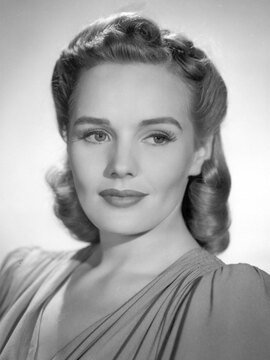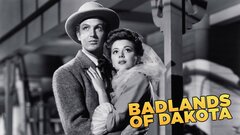Frances Farmer

Actress
Birth Date: September 19, 1913
Death Date: August 1, 1970
Birth Place: Seattle, Washington
Spouses: Leif Erickson
A stunning leading lady of the late 1930s, actress Frances Farmer's starred in the musical "Rhythm on the Range" (1936) and the melodrama "Come and Get It" (1936), both of which helped tag her as a rising star. She worke for a time on the summer stock stages of upstate New York before returning to the Hollywood fold for "The Toast of New York" (1937) and "Flowing Gold" (1940).
Born on Sept. 19, 1913 in Seattle, WA, Farmer was raised by her father, Ernest, a lawyer, and her mother, Cora, a homemaker. Farmer demonstrated her independence early in life and worked a series of odd jobs in order to pay for her schooling at the University of Washington. While there, she won an essay contest conducted by a leftist magazine that earned her a first prize trip to the Soviet Union, where she experienced the pioneering Moscow Art Theatre. Returning the United States in 1935, Farmer continued to study acting and performed in a number of plays at her university. She later moved to New York City in hopes of starting a theater career, but found herself instead recruited by a Paramount Pictures scout, who arranged a screen test that led to a seven-year contract with the studio. Farmer made her film debut in the teen-centered drama, "Too Many Parents" (1936), and later that year starred opposite Bing Crosby in Norman Taurog's Western musical "Rhythm on the Range" (1936). Meanwhile, she married her first husband, actor Leif Erickson, and was sent to Samuel Goldwyn on loan for the melodrama "Come and Get It" (1936), for which her performance as a mother and a daughter was widely praised and the role for which she would be best remembered.
By the end of 1936, although Farmer had barely begun her film career, she was nonetheless being hailed as a bright new star. But Farmer bristled at the studio's unrelenting control of her career and image, which led to her developing a reputation as being difficult. So in 1937, she left Hollywood to take up the summer stock in upstate New York in an effort to burnish her bona fides as a serious actress, landing her first stage role with the Group Theater and playing Lorna Moon in Clifford Odets' "Golden Boy." Despite reviews that she had been miscast, the play became the biggest hit in the Group Theater's history, thanks to Farmer's already established box office appeal. She made arrangements with Paramount that allowed her to perform theater for most of the year while living temporarily in Hollywood to make movies. She was typically loaned out to other studios, like RKO Pictures for "The Toast of New York" (1937), and was normally consigned to rather thankless supporting roles at Paramount. Meanwhile, her reputation for being difficult grew, thanks to her worsening alcoholism, which led to her abruptly leaving a Broadway play written by Ernest Hemingway.
Despite her mounting troubles, Farmer continued to appear onscreen in movies like "Flowing Gold" (1940), starring John Garfield, and the suspense thriller "Among the Living" (1941). She made what became her last major feature appearance in the period swashbuckler "Son of Fury: The Story of Benjamin Blake" (1942), starring Tyrone Power. But by this point, Farmer's personal travails with alcoholism took a drastic turn toward long-running legal and psychological problems that eventually destroyed her. Her very public issues began with an arrest on Oct. 19, 1942, when she was pulled over in Santa Monica for driving with her headlights on during a wartime blackout. Farmer was allegedly verbally abusive, leading to her arrest under suspicion of being drunk. She paid half of her fine and was given a suspended sentence, but failed to pay the rest of her fine and a warrant was issued for her arrest. Police found Farmer at a hotel and placed her under arrest, but she became physically abusive, even knocking down one of the officers as she was hauled kicking and screaming out of the hotel. While the newspapers gave their typically sordid accounts of what happened, Farmer was transferred to the psychiatric ward of L.A. General Hospital, where she was diagnosed as a manic depressive.
Farmer was soon transferred to another facility, the Kimball Sanitarium, a minimum security hospital where she was diagnosed a paranoid schizophrenic and given insulin shock therapy without her consent. She finally decided to just leave and walked out of the hospital. Farmer wound up at her half-sister's house nearby. Following a legal fight over her guardianship, Farmer was granted permission to live with her mother in Seattle. After six months of vicious fighting, Farmer attacked her mother and was committed to Western State Hospital, where she received electroshock treatment and was deemed cured after three months. Upon her release in 1944, she was traveling to Nevada with her father when she suddenly ran away and was arrested in California for vagrancy. Once again, the newspapers had a field day with the arrest, which forced her into seclusion with her aunt in Reno. Eventually, the troubled actress moved back with her parents and found herself recommitted to Western State Hospital by her mother. This time, however, her stay lasted five years and was filled with horrific stories of rape and abuse, and even wild speculation.According to her posthumously released, ghostwritten autobiography, Will There Really Be a Morning?, Farmer recounted being raped by hospital staff, chained inside her cell, and routinely splashed with ice water. Later allegations were made by others than she received a lobotomy at the hospital, but both Western State - which openly performed the procedure on hundreds of patients - and her family vehemently denied the claim. Meanwhile, in 1950, Farmer was finally released and given over to her mother once again. Fearing being sent back to her, Farmer managed to secure her full civil rights. She briefly married for a third time and quietly worked as a bookkeeper at a photo studio. In 1957, Farmer found renewed interest in her career when an interview was printed in Modern Screen magazine, which led to appearances on "The Ed Sullivan Show" (CBS, 1948-1971) and "This Is Your Life" (NBC, 1952-1961). She even returned to the stage, performing summer stock in a production of "The Chalk Garden," which led to her being the host of "Frances Farmer Presents" (WFBM-TV, 1958-64), an anthology series that showcased vintage movies.Even during this resurgence, Farmer continued her erratic behavior and was fired, then rehired from her show. In 1965, she performed in a production of "The Visit" at Purdue University and was arrested once more for driving drunk. But when her life began spiraling toward darkness, she found redemption through her association with a friend and her children that eventually led to her conversion to Roman Catholicism. Having finally lost the urge to drink, Farmer lived the remainder of her life in relative peace, though she ran into financial trouble when an investment manager embezzled funds from her and her business partner while trying to start a cosmetics company. She eventually passed away on Aug. 1, 1970 from esophageal cancer at 56 years old. A fascinating story if there ever was one, Farmer's life was retold in the feature film "Frances" (1982), which starred Jessica Lange in an Oscar-nominated performance, and the made for television movie "Will There Really Be a Morning?" (CBS, 1983), starring Susan Blakely. Years later, Kurt Cobain of Nirvana wrote the song "Frances Farmer Will Have Her Revenge on Seattle," which appeared on their In Utero (1993) album. The Washington native later said he felt a kinship with the troubled actress and was appalled at the treatment given her by the state and her own parents.
By Shawn Dwyer
Credits

Studio OneStream

Son of Fury

Badlands of Dakota

World Premiere

Among the Living

South of Pago Pago

Flowing Gold

Ride a Crooked Mile

Ebb Tide

Exclusive

The Toast of New York

Come and Get It

Border Flight






















































































